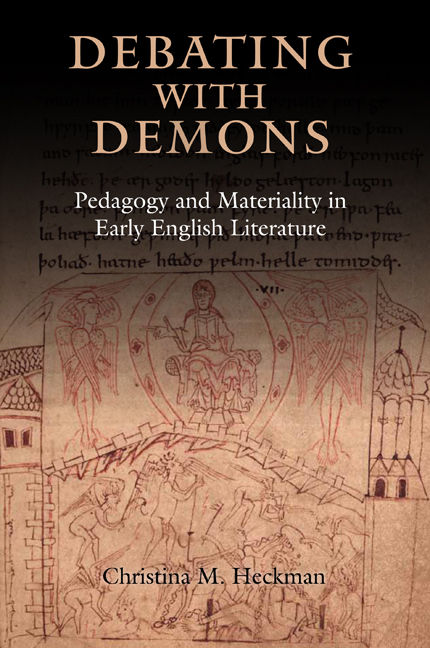Book contents
- Frotmatter
- Dedication
- Contents
- Introduction: The Devil’s Secret Chamber
- Part I Foundations
- 1 Spirituo-Materiality in the Early Middle Ages
- 2 The Artes Liberales in the Early Middle Ages
- 3 The Devil Within: Perils of Pedagogy in the Monastic School
- Part II The Demonic Magister in Early English Poetry
- 4 The Origin of the Teaching Demon: Lucifer as Magister
- 5 Demonic Teaching and the Fall in the Old English Genesis
- 6 Demonic Teaching and Saintly Discretio in Cynewulf’s Juliana
- 7 Inventing Materia: The True Cross and Saintly Disputation in Cynewulf’s Elene
- Conclusion: The Mysteries of Pedagogy
- Bibliography
- Index
- Acknowledgments
- Anglo-Saxon Studies
Introduction: The Devil’s Secret Chamber
Published online by Cambridge University Press: 06 October 2020
- Frotmatter
- Dedication
- Contents
- Introduction: The Devil’s Secret Chamber
- Part I Foundations
- 1 Spirituo-Materiality in the Early Middle Ages
- 2 The Artes Liberales in the Early Middle Ages
- 3 The Devil Within: Perils of Pedagogy in the Monastic School
- Part II The Demonic Magister in Early English Poetry
- 4 The Origin of the Teaching Demon: Lucifer as Magister
- 5 Demonic Teaching and the Fall in the Old English Genesis
- 6 Demonic Teaching and Saintly Discretio in Cynewulf’s Juliana
- 7 Inventing Materia: The True Cross and Saintly Disputation in Cynewulf’s Elene
- Conclusion: The Mysteries of Pedagogy
- Bibliography
- Index
- Acknowledgments
- Anglo-Saxon Studies
Summary
The Vercelli Book (Vercelli, Biblioteca Capitolare CXVII), an early English codex often dated to the late tenth century and famous for poems such as The Dream of the Rood, also includes a collection of homilies in Old English. One of these preaching texts, Vercelli Homily X, is an exhortation to repentance that includes an explanation of the Incarnation, an account of the Last Judgment, a commentary on the parable of the rich man in Luke 12:16–21, and a lament about the transitory nature of earthly life. In the homily's Judgment scene, Satan represents himself as a musician who plays his harp to lure vulnerable souls away from God with the sweetness of his song. In the homilist's account, these souls pursue their fate through physical actions, hearing Satan's music, turning toward him, and entering the place Satan has prepared for them: woldon hie in minon hordcofan, [ond] þin cynerice eal forgeaton (‘they wished [to be] in my secret chamber, and completely forgot your kingdom’). The devil calls this chamber his hordcofa, a hidden room (cofa) where he keeps his treasure (hord). It is a private, enclosed place, contrasting with the vast realms of the Judge's kingdom (cynerice) and providing the illusion of protection from exposure at the Judgment. In the devil's chamber, vulnerable souls choose his secret sins, yearning for his presence and rejecting God's teaching. His hordcofa is both metaphorical and physical, not only thought but seen, heard, and felt. It is both a state of mind and a place, a locus in which the spiritual, material, and spatial coincide. And, though this chamber seems to provide safety, it is the place of greatest danger to Satan's listeners, whose misdeeds will ultimately be revealed openly before the Judge and punished with damnation.
In the homily, the movements of the soul-in-the-body represent the choices of the will, as the souls who first go astray through the operation of their senses eventually yield to more dangerous instruction. Drawn into Satan's secret room by his music, they are taken in by sensual enjoyment: ðonne ic mine hearpan genam [ond] mine strengas styrian ongan, hie ðxt lustlice gehyrdon, [ond] fram þe cyrdon [ond] to me urnon (‘when I took my harp and began to stir my strings, they heard that with pleasure, and turned from you and hastened to me’).
- Type
- Chapter
- Information
- Debating with DemonsPedagogy and Materiality in Early English Literature, pp. 1 - 12Publisher: Boydell & BrewerPrint publication year: 2020

